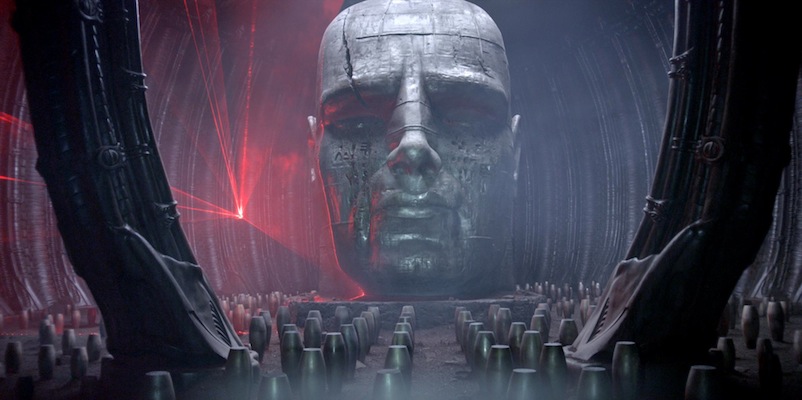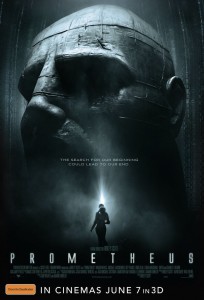Ridley Scott returns to a genre that he helped define to crack open the mysteries of the universe, and once again proves his mastery of ensemble casts. Yet after thirty years, is he now the leader or a disciple?
[stextbox id=”grey” caption=”Prometheus (2012)” float=”true” align=”right” width=”200″]
Director: Ridley Scott
Writer(s): Jon Spaihts, Damon Lindelof
Runtime: 124 minutes
Starring: Noomi Rapace, Michael Fassbender, Guy Pearce, Idris Elba, Logan Marshall-Green, Charlize Theron
Distributor: Fox
Country: US
Rating (?): Better Than Average Bear
[/stextbox]
Over the course of the last four decades or so, Ridley Scott has carved out an enviable filmography spanning numerous breeds and styles. Although he has not made a science fiction film since 1982’s Blade Runner, Scott is perhaps most closely associated with this genre thanks to the countless imitators his seminal work spawned. Coupled with Alien (1979), arguably the finest example of sci-fi and horror to ever grace the screen, Scott need never make another film. Yet he has continued to explore everything from ancient history to modern politics, but never with quite the same mastery and love that his earlier work demonstrated. With Prometheus, Scott finally has a giant platform to ask the kinds of questions he has been ruminating on for the last three decades, whether we like the answers or not.
Archeologists Elizabeth Shaw (Noomi Rapace) and Charlie Holloway (Logan Marshall-Green) make the remarkable discovery that seemingly unrelated ancient peoples on Earth shared a common message and a invitational star map. Shaw and Holloway believe it to point to the home of the “Engineers” of human existence. Leading them into a distant star system on the funding of corporate giant Peter Weyland (Guy Pearce), a small crew headed by Meredith Vickers (Charlize Theron) board the spaceship Prometheus. There they are kept in statsis and tended to by synthetic humanoid David (Michael Fassbender) until they reach their destination. What they find upon arrival is not what they expected.
Prometheus begins by asking the big existential questions, and it is in this ambition that the film will distinguish itself from all other comers this season. Indeed, these opening moments are majestic, visually and emotionally, drawing us into the not-too-distant future world with the promise of a mystery to be unravelled. Like Alien before it, as the comparison will inevitably be made for a number of reasons, the captivating element here is the human story, the simple crew interactions as well as the politics and motivations. Casting elite acting talent in roles that may only have a handful of scenes, particularly Idris Elba as the captain of the ship, is demonstrative of Scott’s commitment to maintaining a grounded reality to his fiction at all times. This humanity above all things is the essence of the story after all.
As the revelations come to light, Scott’s Prometheus takes several dramatic turns in tone that are entirely expected, but revelatory and gripping nonetheless. Major flag-posts to the true identities of certain personnel are firmly planted moments into the main narrative, and these are never so much shocks as necessary elements in the genre. After all, Prometheus has had its own star-map laid out for it a long time ago, and the process of arriving, exploring and being picked off one-by-one is a fairly standard plot device by now. It is when LOST scribe Damon Lindelof’s script tries to reconcile these elements with Scott’s bigger picture that the film finds itself adrift in a sea of weighty, and sometimes overblown, special effects self-gratification and an equally heavy Marc Streitenfeld score.
Visually, Prometheus is spectacular, Scott displaying a mastery of 3D in his first outing with the medium. The claustrophobia of the caves being explored never falls into the mirky brown depths of Sanctum, and the alien and human worlds maintain a consistent feel throughout. Also striking is his mixture of man and machine, particularly in Fassbender’s David, who models himself on the poise of Peter O’Toole’s Lawrence of Arabia. Yet where the real strengths lie, just as they did with Alien, are in the singular female against the menace, the most gripping scenes involving Rapace fighting off inner and outer demons as a matter of survival, all the while asking her aggressors “Why?”.
Prometheus is a stunning film, maybe even a brilliant one, but its weaknesses lie in its self-imposed mandate to be compared to another film, especially given where the film unceremoniously leaves us. The film’s initial intrigue is never fully paid-off, and while it is great to not have all of our questions answered for a change, there is something incomplete about it as well. Scott’s penchant for director’s cuts will inevitably reveal more, with some sequences feeling compressed in this theatrical outing. Lindelof has already stated that he foresees another film following this to go off on other tangents, and it would certainly benefit by not being associated so closely with that superior film. In the end, Prometheus is a prequel, just perhaps not to the film we though it would be.
Prometheus is released in Australia on 7 June 2012 from Fox, and on 8 June 2012 in the US.






